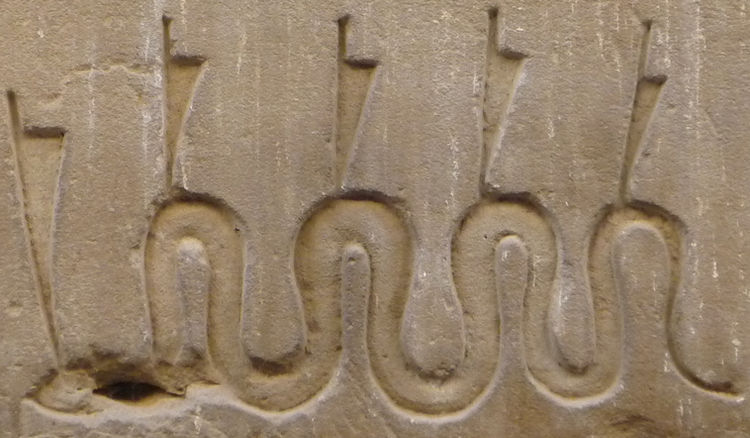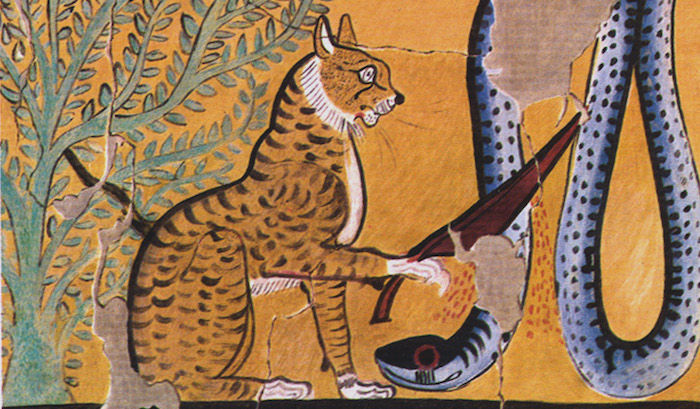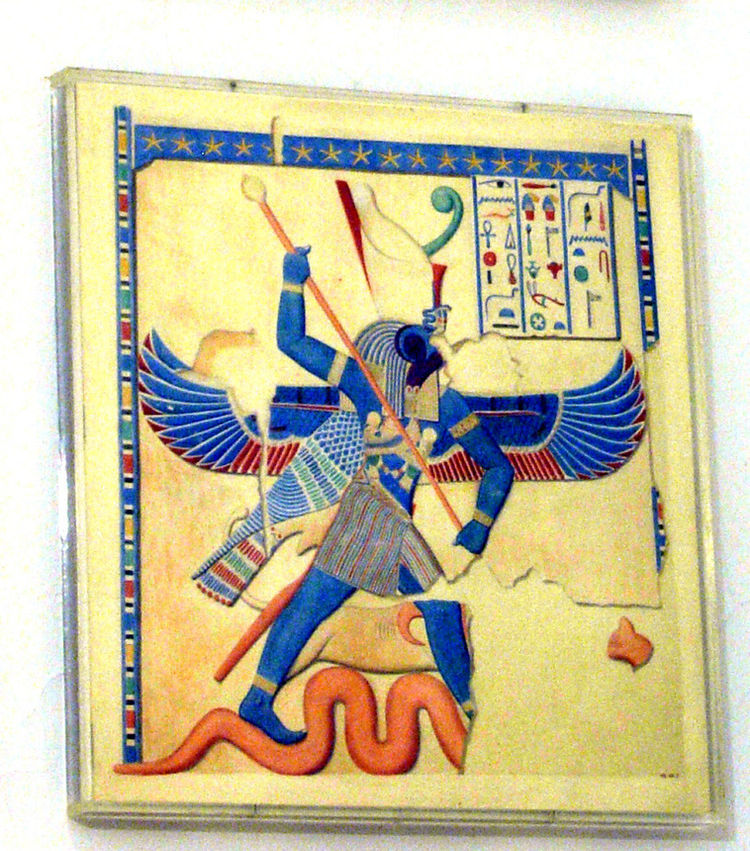The Book of Overthrowing Apep is a 4th-century B.C. Egyptian religious text intended to help the priesthood assist the sun god Ra in his nightly struggle against the chaos serpent Apep. You wouldn’t want to read it yourself, but it does contain some striking and very gameable imagery! Let’s look at the coolest stuff in The Book of Overthrowing Apep and then talk about three ways you can turn the book into an RPG adventure in your fictional campaign setting!
This post is brought to you by beloved Patreon backer Justin Moor. Thanks for helping keep the lights on! If you want to help keep this blog going alongside Justin, head over to the Patreon page – and thank you!

Apep (or Apophis) was an ancient Egyptian snake god of darkness, storms, and chaos. Every night, when the sun god Ra sailed his boat east through the underworld to the place where he would rise in the morning, Apep would stalk Ra and try to kill him. This was the same underworld through which the souls of dead mortals would travel on their way to the afterlife. If they encountered Apep along the way, he would try to destroy them too! Egyptians didn’t much care for the idea of an evil snake god devouring the sun and their dead loved ones. So one of the functions of Egyptian state religion was to help Ra in his nightly battle against Apep.
Hence the need for The Book of Overthrowing Apep, a collection of invocations against Apep, performed daily at the temple of Amun-Ra. The incantations also praise Ra and the Pharaoh and – tellingly – rail against rebels against the Pharaoh the same way it does against Apep, and frequently draws no distinction between the two. The copy of the book that has survived comes from a papyrus written in the 300s B.C., when Egypt was ruled by the successors of Alexander. The Book of Overthrowing Apep is repetitive. The following paragraph will give you the gist of most of its contents:
“Be thou utterly spat upon, O Apep. Get thee back, thou foe of Ra; fall, creep away, take thee off! I have turned thee back, I have cut thee up, and Ra is triumphant over thee, O Apep. Get thee back, thou rebel; be thou annihilated! Verily I have burned thee, verily I have destroyed thee, I have condemned thee to all ill, that thou mayest be annihilated, that thou mayest be utterly spat upon, that thou mayest be utterly non-existent.”
It’s basically just that for page after page after page.

For all its repetitiveness, The Book of Overthrowing Apep has some really wonderful and gameable imagery. Here are my thirteen favorites, organized in increasing severity:
Fall upon thy face, O Apep thou foe of Ra, submerge, submerge, go forth unrecognized, creep away, away!
They who should be bound are bound, Apep that foe of Ra is bound; mayest thou not know what is done to thee, O Apep.
Get thee back from thy place, for thy roads are blocked, thy paths are stopped up; thou art imprisoned in thy former place; thou art powerless.
Seize, seize, O butcher, fell the foe of Ra with thy knife. Seize, seize O butcher, fell the foe of Pharaoh with thy knife. These are your heads, ye rebels, this is that head of thine, O Apep, which are cut off by the warrior-priest with his knife.
I have cut away his flesh from his bones, I have broken his legs, I have cut off his arms. I have closed his mouth and his lips, I have drawn his teeth, cut away his tongue, taken away his speech, blinded his eyes, taken his hearing, and cut out his heart.
Pharaoh, he adores Ra and thrusts his spear into Apep; he takes a flaming brand and sets fire to him; he chastises the body of thy foe.

Their faces are against thee with their flame. With knives of flint, they burn thee in thine intestines, they crush thee with their knives; the Children of Horus crush thee, their magic enters into thee, their spells come into being against thee.
Fire be in thee, O Apep, thou foe of Ra. May the Eye of Horus have power over the soul and the shade of Apep; may the flame of the Eye of Horus devour that foe of Ra; may the flame of the Eye of Horus devour all the foes of Pharaoh, dead or alive.
Thou shalt have no tomb, but thou shalt enter into the fiery furnace, for the great god who came into being of himself shall fell thee and those who are in his boat shall destroy thee by means of the spells of their utterance and by means of the magic which is in their bodies.
Thou shalt be condemned to the great furnace of fire, the mistress of heat, and its glow shall consume your soul.
I have removed his place, his seat, and his tomb. I have destroyed his soul, his spirit, his body, his shade, his magic, his seed, his egg, his bones, and his hair.
Though thou shalt not exist, thou shalt suffer.
Thy soul is despoiled, thy name is obliterated. May thy name by unheard, may thy name fall. Be thou forgotten and driven back that thou mayest be forgotten.

Let’s look at three ways we can turn The Book of Overthrowing Apep into an RPG adventure! In all cases, we’ll be drawing from the above thirteen ‘good parts’ and treating them as if they’re the full text.
First, the book might serve as a clue or something that kicks the adventure up a notch. This allows the book to color or flavor the adventure while keeping the adventure fundamentally about something else. For example, the PCs might be asked to catch a serial killer. When you describe the killer’s first few murders, tell the players that the PCs recognize a pattern: the killings are consistent with references to The Book of Overthrowing Apep. This suddenly turns the killings even weirder and it gives the party a variety of hooks they can follow up on. They might inquire in local religious circles influenced by ancient Egypt, maybe New Age or the Unity Church. Plus, the book gives the party valuable context they can use to unravel the case. For example, at a crime scene where the victim was burned, the police found an animal’s eyeball. The PCs may correctly conclude the killer intended it as the Eye of Horus, the falcon-headed god of vengeance, and go talk to local falconers to see if anybody new has been buying falcons and secretly popping their eyes out. The adventure remains fundamentally a serial killer investigation, but The Book of Overthrowing Apep lends it a different character that will make it more colorful and memorable for your players.
Second, the book might serve as a Macguffin – the thing the PCs need to retrieve to make the plot happen. The Book of Overthrowing Apep makes a great Macguffin because its weirdness can impact the way the plot occurs. For example, in an adventure where the party is going up against a supernatural adversary – be it as epic-tier as Llolth or as low-level as a hungry ghost – you might have them seek out the book as a tool to fight the creature. Then, after they convince some folks to chant the invocations in it daily, they go fight the Big Bad – and the imagery in the book appears sequentially during the fight. This gives the PCs a big help and serves as a sort of ever-shifting terrain that keeps the fight varied and interesting.
Finally, the book might be the very core of the adventure, its text at the heart of what the PCs must do. (Incidentally, this is akin to the route I took for Shanty Hunters.) For example, what if The Book of Overthrowing Apep is supernaturally potent and bad guys get their hands on it? What if they plan to change the text a little to overthrow not Apep but the President (or whomever)? Now the good guys have to protect the President from the power of the book while hunting down the bad guys to stop their recitations!
This suggests a two-part adventure: one for protecting the President and one for going after the villains. Ask the players which mission they want the PCs to take on. Prepare pregenerated characters for the other mission. Then alternate scenes! Do one scene where one set of characters protects the President from the first threat from the book (“Fall upon thy face…”). Then do a scene with the other set of characters (played by the same players) as they try to track down the bad guys. Then go back to the first group as they face the next one to three threats from the book. In each case, if the hunter/tracker characters make reasonable progress in their scene, throw two book threats at the President-protecting characters. If they make speedy progress, only throw one book threat. If they make little or no progress, throw three threats. Because the threats get worse as the list progresses, the players had better do a good job when playing the hunter/tracker characters! Laggardly play in the first few scenes adds up quick!
–
Enjoy this post? Consider sharing it on Facebook or Twitter to increase visibility for the Molten Sulfur Blog!
Source: R. O. Faulkner’s translation of the Bremner-Rhind Papyrus, published in pieces in The Journal of Egyptian Archaeology in December 1936, December 1937 and June 1938.






